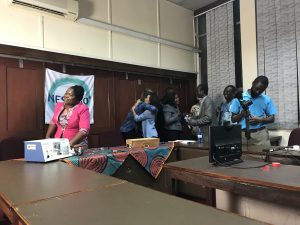
To say that today is a big day for Rice 360 is an understatement. For the past year this program has been applying for the 100&change grant from the MacArthur which from the foundation website would provide 100 million dollars to “fund a single proposal that promises real and measurable progress in solving a critical problem of our time.” The Rice 360 Institute of Global Health is currently one of the 8 semifinalists; the proposal is to deploy a 16 piece Newborn Essential Solutions and Technologies (NEST) package prevent 85% of neonatal deaths in Malawi and to reduce newborn mortality by 50% in 10 years. Much more information can be found on the MacArthur Foundation website and the Rice 360 Nest 360 page, but being able to intern during this pivotal time, I’ve been lucky to see the parts of the process behind the scenes and talk to some of the very accomplished professors, doctors, and entrepreneurs.
One of the people I’ve been privileged to get a chance to talk to was Professor Kara Palamountain, a research associate professor and global health lecturer at the Northwestern Kellogg School of Management with extensive experience in entrepreneurship and industry. An expert on technology adoption, talking with her was illuminating to see what happens after the engineering design and next steps for successful implementation. This is especially relevant in developing areas where needed technology already exists, but distribution is challenging preventing widespread access. As a result many companies focus their resources in areas that are already well connected which creates an even greater disparity. An comparison she gave was to think of a lemonade stand selling drinks in on a certain street. If the stand earns enough money to expand their business they can either choose to sell other goods like sugar cookies or open up new stands in other areas. But because more people are needed to run the stand and relationships with the new neighbors need to be established many times it’s much easier to build up rather than build out. RICE 360, in addition to tailoring technologies for these developing regions, endeavors to build out and establish a roadmap for implementation, increasing both access and opportunities for more companies to follow.
So with such a daunting task ahead, what makes someone suited to undertake such an endeavor? More generally, what makes someone a good entrepreneur? Connections? Charisma? Determination? Interestingly enough Professor Palamountain immediately answered knowing when to quit. Rather than persevering, picking and choosing your battles can help sort out great ideas from lackluster ones. This is especially relevant to me in the context of GLHT 360; the silica goggles I worked on may be useful but upon conferring with medical professionals there are many other issues here especially like fixing oxygen concentrators that are more pressing. While it is disheartening it is better to understand that this is just part of the process and move on. But this advice will be definitely something to consider in the years to come where things will have much less structure than university.